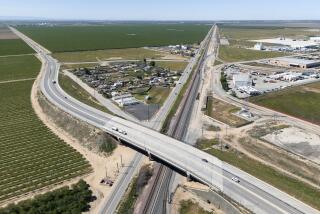Residents Say They See Only Industry’s Ugly Side
- Share via
In some cities dominated by major industries, companies lead community improvement efforts.
In El Segundo, for example, corporate officials have developed a five-year computer program for the school district, donated educational equipment to local campuses, taught math classes, renovated vandalized Girl Scout facilities and financed child-care studies.
Industries there say it comes with “being part of the family,” as a Chevron USA Inc. official put it.
But in Wilmington, industry is often a distant third cousin, many residents charge. They say many large companies that make money in Wilmington don’t invest it in the community. For an area saddled with heavy industry’s unsightliness, pollution, noise, truck traffic and toxic waste, many residents say they are getting little in return--in some cases, not even jobs.
Variety of Responses
“The companies come to Wilmington, make their money and run,” said Trinidad Godinez, a 30-year resident. “I don’t see that these companies have done anything for the community.”
Corporate officials in Wilmington have a variety of responses. Some say they make charitable contributions, but not always locally and sometimes indirectly-- through the United Way, for example. Some say they have not been asked to help, a point many residents concede. All say they contribute to the community with their payrolls, subcontracts and taxes.
And some industry leaders say it’s not their job to improve a community.
“The industries here use the community,” countered George De La Torre, co-owner of Harbor Canning Co., a Wilmington business since 1946. “I believe here, right here where they operate, they should give. It doesn’t take much to see that the community needs help.”
Many residents and workers assert that if a company is doing well in a community, it has an obligation to share at least some of its wealth--by providing financial contributions, expertise or material donations.
Actually, some Wilmington industries have contributed to the community. About 10 years ago Exxon U.S.A., which owns 300 of Wilmington’s 655 oil pumps and a petroleum collection station, provided the land and some materials for the development of a baseball park. De La Torre’s business, Harbor Canning, also has made major contributions, including co-sponsorship of Wilmington’s annual fiesta and regular support to several social service agencies.
In the last several years, other industries have contributed more than $100,000 to the Wilmington Boys’ Club and, to a lesser extent, money for scholarship programs at Banning High School, Wilmington’s only secondary campus. Many industry officials say they also contribute to United Way Inc., which in turn assists some community programs.
Debt Owed
But many residents say industry owes Wilmington more. Contributions have been infrequent and too often provided by only a few companies, they say. In a nine-square-mile community dominated by 1,000 businesses--about 30% of which have 50 employees or more, according to a Wilmington Chamber of Commerce estimate--corporations should play a significant role in community improvement, residents say.
Said Lee Anderson, chief fund-raiser for the Wilmington Boys’ Club and wife of U.S. Rep. Glenn Anderson (D-Harbor City): “This is a terribly wealthy area industrially, except the companies close their doors at 5 p.m. and go home to other areas. That’s a fact, but I’m not sure anyone has addressed the problem to them. . . . I think that may be starting to change.”
Some corporate leaders say critics forget industry’s economic impact on the community and exaggerate industry’s ability to improve an area. Wilmington’s major industries include three petroleum refineries, dozens of other oil-related companies, several large chemical plants and numerous port-related trucking and shipping firms.
“We’ll listen to people if they make a request, but just because a group of major corporations pour money into a community doesn’t mean the community is going to be better off,” said D. J. Maffuccio, plant manager of Texaco Inc.’s Wilmington refinery. He added that most of the company’s charitable donations go toward such cultural groups as New York’s Metropolitan Opera and, closer to home, the Long Beach Civic Opera.
“Certainly if industry moved out, people would feel the losses,” he added. “I think people are overlooking the impact on the economy that a company like this can have.”
There is a question, however, about economic impact. Although taxes channeled into local government appear significant, Wilmington receives no larger share of services than other areas and, many residents claim, actually receives far less than it is due. Large industries may create economic opportunity for smaller firms, but some major companies do not employ large numbers of local residents.
Few Resident Employees
At Texaco, for example, only 31 of its 520 Wilmington refinery employees are Wilmington residents, while at Union Oil Co. of California’s refinery, 19 of about 600 workers live in Wilmington, company officials said. Korody-Colyer Corp., a manufacturer of diesel-engine replacement parts, has 67 Wilmington residents among its estimated 400 workers. United States Borax and Chemical Corp. says 41 of its 210 employees live in the community, while IT Corp., a hazardous-waste hauling company, employs 16 Wilmington residents among 247 workers.
“Looking at the majority of Wilmington residents who come to our office, it’s predominantly blue-collar and semi-skilled workers,” said Henry Kaneshiro, manager of the employment development department of Carson Job Service, which also serves Wilmington residents. “Not all of them have the skills that these kind of companies require. That’s probably the biggest reason for the lack of employment.”
Even in Wilmington’s fledgling, city-subsidized industrial park--which was designed to provide new jobs--there are no guarantees that Wilmington residents will be employed.
Ironically, perhaps, the lack of Wilmington employees is a reason cited by some companies for their lack of community involvement. Said Charles M. Dollbaum at Union Carbide Corp., which produces nitrogen and several other products, “We only have 50 employees and almost none are from Wilmington. . . . We don’t really get involved in Wilmington.”
Some industry leaders say community improvement is government’s job.
City Responsibility
“It is the responsibility of government to clean up the community, not (of) industry,” said Peter P. Aguilera, president and owner of P & E Terminal Co. Inc., a Wilmington container handler. “If the city is collecting the taxes, then it is the city’s responsibility. The one elected to represent the people should be doing this, and if people aren’t happy, they should elect someone else.”
But some representatives of Wilmington industry agreed with residents that local companies have not met their obligations.
“In general, I would say industries have probably been a little remiss in not doing enough for the community,” conceded Thomas B. Williams, superintendent for operations at the Union Oil refinery. “I wouldn’t say irresponsible, just remiss. The need for something to be done is much clearer than the responsibility of who should do it.
“All industries have a responsibility and that responsibility is taking place through taxation. Beyond that, it gets to be a moral issue. I think anyone who is doing well in a community should give back to it. The community is not feeling an unreasonable expectation.”
De La Torre of Harbor Canning suggested that industries “could take a certain project under their wing for support every so often. If they would just pick a local charitable organization and say, ‘Here, for one year I will help you,’ it would make a great difference in Wilmington.”
“It would be nice if we had an industrial association that would get together and ask the community, ‘If we give something, what would your priorities be?’ ” said Councilwoman Joan Milke Flores, Los Angeles representative for Wilmington. “But that happens more where industry really wants to locate and has to do that as an entree to gaining community support.”
Big Difference
Although many residents agree that such efforts would make a big difference, they also acknowledge that they could do more to encourage them.
“I would love to see them contribute more to us,” said Tom Martinez, a former Jaycees president who helped lead a community effort to build a sports complex. “But we don’t know how to knock on their doors. We’re not experienced in how to contact major industries for funding. It’s a two-way street: We don’t feel they’ve been contributing to us, but we don’t know how to reach them. Most of us are simple people who know how to dig a ditch out here, but we don’t know how to contact Texaco.”
Indeed, many business representatives interviewed by The Times said they had not often been approached for contributions.
“If they need contributions, they should ask,” said George J. Michelback, regional manager of Express Intermodal Transport, a Wilmington trucking company. “I never thought of it because, truthfully, no one’s ever approached me before.”
More to Read
Inside the business of entertainment
The Wide Shot brings you news, analysis and insights on everything from streaming wars to production — and what it all means for the future.
You may occasionally receive promotional content from the Los Angeles Times.










